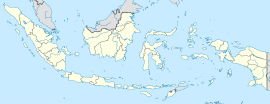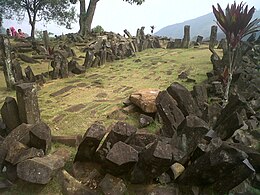 A view of Gunung Padang A view of Gunung Padang | |
 | |
| Location | Karyamukti, West Java, Indonesia |
|---|---|
| Coordinates | 6°59′38″S 107°03′23″E / 6.99389°S 107.05639°E / -6.99389; 107.05639 |
| Type | Megalith |
| Site notes | |
| Discovered | 1890 |
| Archaeologists |
|
Gunung Padang is an archaeological site located in Karyamukti, West Java, Indonesia, 50 kilometres (31 mi) southwest of Cianjur. Located at 885 metres (2,904 ft) above sea level, the site covers a hill—an extinct volcano—in a series of five terraces bordered by retaining walls of stone that are accessed by 370 successive andesite steps rising about 95 metres (312 ft). It is covered with massive hexagonal stone columns of volcanic origin. The Sundanese people consider the site sacred and believe it was the result of King Siliwangi's attempt to build a palace in one night.
Gunung Padang consists of a series of five artificial terraces, one rectangular and four trapezoidal, that occur, one through five, at successively higher elevations. These terraces also become successively smaller with elevation, with the first terrace as the lowest and largest and the fifth terrace as the highest and smallest. These terraces lie along a central, longitudinal NW–SE axis. They are artificial platforms created by lowering high spots and filling in low spots with fill until a flat surface was achieved. The terrace perimeters consist of retaining walls formed by volcanic polygonal columns stacked horizontally and built vertically as posts. The terrace complex is accessed by a central stairway with 370 steps, an inclination of 45 degrees, and a length of 110 m (360 ft).
History of study

Dutch historian Rogier Verbeek mentioned the existence of the Gunung Padang site in his book Oudheden van Java: lijst der voornaamste overblijfselen uit den Hindoetijd op Java, based on a visit and report by M. De Corte in 1890
Goenoeng Padang : Op den bergtop Goenoeng Padang, nabij Goenoeng Melati, eene opeenvolging van 4 terrassen, door trappen van ruwe steenen verbonden, met ruwe platte steenen bevloerd en met talrijke scherpe en zuilvormige rechtopstaande andesietsteenen versierd. Op ieder terrasse een heuveltje, waarschijnlijk een graf, met steenen omzet en bedekt, en van boven met 2 spitse steenen voorzien. In 1890, door den heer De Corte bezocht.Goenoeng Padang : On the mountain top Goenoeng Padang, near Goenoeng Melati, a succession of 4 terraces, connected by steps of rough stone, paved with rough flat stones and decorated with numerous sharp and columnar upright andesite stones. On each terrace a small mound, probably a grave, surrounded and covered with stones and topped with 2 pointed stones. In 1890, visited by Mr. De Corte.—Rogier Verbeek, Oudheden van Java,1891.
The notes on the Gunung Padang site in Verbeek's book are similar to those made by Dutch archaeologist Nicolaas Johannes Krom in the 1914 "Rapporten van de Oudheidkundige Dienst" ("Report of the Department of Antiquities").
After 1914, the site was largely forgotten until 1979, when a group of local farmers rediscovered Gunung Padang. This discovery quickly attracted the attention of the Bandung Institute of Archaeology, the Directorate of Antiquities, PUSPAN (now the Center for Archaeological Research and Development), the local government, and various community groups. Throughout the 1980s, these organizations conducted joint archaeological research and restoration work at Gunung Padang. In 1998, the Indonesian Ministry of Education and Culture declared it a heritage site of local interest. At the end of June 2014, the ministry declared Gunung Padang a National Site Area, covering a total of 29 hectares (72 acres).
On 1 October 2014, surveyors halted excavation activities temporarily, hoping to begin them again under the new government. The 2014 excavation has been criticized for being improperly conducted.
Age estimates
Archaeologist Lutfi Yondri from the bureau of archaeology in Bandung has estimated that the structures at Gunung Padang may have been built sometime between the 2nd and 5th centuries CE, thus in the Indonesian late prehistoric period, whereas Harry Truman Simanjuntak has suggested a later date in historical times, between the 6th and 8th centuries CE. Pottery fragments found at the site were dated by the bureau of archaeology in the range 45 BCE–22 CE.
Fringe date hypothesis
Danny Hilman Natawidjaja, an Indonesian geologist, has claimed that the site had been built as a giant pyramid 9,000 to 20,000 years ago, implying the existence of an otherwise unknown advanced ancient civilization. Natawidjaja's analysis has been questioned by other scientists. Vulcanologist Sutikno Bronto concluded that Gunung Padang is the neck of an ancient volcano and not an artificially created pyramid. Archaeologist Víctor Pérez has described Natawidjaja's conclusions as pseudoarchaeology.
Natawidjaja's ideas gained the attention of Indonesia's president Susilo Bambang Yudhoyono, who set up a task force. An archaeologist who did not wish to be named due to the involvement of the country's president stated:
In archaeology we usually find the 'culture' first ... Then, after we find out the artefact's age we'll seek out historical references to any civilisation which existed around that period. Only then will we be able to explain the artefact historically. In this case, they 'found' something, carbon-dated it, then it looks like they created a civilisation around the period to explain their finding.
Natawidjaja has been joined by a former activist-turned-politician and member of Yudhoyono's Democratic Party, Andy Arif, in advancing these pseudoarchaeological ideas. Thirty-four Indonesian archaeologists and geologists signed a petition questioning the motives and methods of the Hilman-Arif team and submitted it to Yudhoyono.
In October 2023, an article by Natawidjaja et al., published in Archaeological Prospection, claimed that Gunung Padang is the oldest pyramid in the world, dating as far back as 27,000 years ago. In March 2024, the publisher of Archaeological Prospection, Wiley, and the editors, retracted that paper, stating that:
...the radiocarbon dating was applied to soil samples that were not associated with any artifacts or features that could be reliably interpreted as anthropogenic or "man-made". Therefore, the interpretation that the site is an ancient pyramid built 9,000 or more years ago is incorrect, and the article must be retracted.
See also
References
- Ramadina, Savitri Putri (2013). "Analisis Perupaan Situs Megalitik Gunung Padang di Cianjur, Jawa Barat" [Sculpture Analysis of the Megalithic Site of Gunung Padang in Cianjur, West Java]. ITB Journal of Visual Art and Design. 4 (1): 51–66. doi:10.5614/itbj.vad.2013.4.1.7.
- ^ Pérez García, Víctor Lluís (2017). "Gunung Padang y el megalitismo indo-malayo: Arqueología y pseudoarqueología" [Gunung Padang and Indo-Malay Megalithism: Archeology and Pseudoarchaeology] (PDF). Arqueoweb: Journal of Archeology on the Internet. 18 (1): 62–104. Archived from the original (PDF) on 5 May 2018. Retrieved 12 November 2022.
- Yondri, Lufti (2014). "Punden Berundak Gunung Padang Refleksi Adaptasi Lingkungan dari Masyarakat Megalitik" [Punden Berundak Gunung Padang Reflection of Environmental Adaptation from Megalithic Society]. Jurnal Sosioteknologi. 13 (1): 1–14. doi:10.5614/sostek.itbj.2014.13.1.1.
- Verbeek, Rogier Diederik Marius (1891). Oudheden van Java: lijst der voornaamste overblijfselen uit den Hindoetijd op Java, met eene oudheidkundige kaart [Antiquities of Java: list of the most important remains from the Hindu period on Java, with an archaeological map] (in Dutch). Landsdrukkerij. p. 43.
- Nederlandsch-Indië, Oudheidkundige Dienst in (1914). Rapporten [Reports] (in Dutch). Bataviaasch Genootschap van Kunsten en Wetenschappen.
- "Balai Pengelolaan Situs Gunung Padang Segera Dibentuk" [Gunung Padang Site Management Center to be Established Soon]. 25 June 2014.
- "Timnas Gunung Padang Hentikan Penelitian" [Gunung Padang National Team Stops Research]. 1 October 2014.
- Dipa, Arya (24 September 2014). "Archaeologists slam excavation of Gunung Padang site". thejakartapost.com.
- Utomo, Yunanto Wiji (6 June 2014). "Mari Terbang ke Atas Situs Megalitikum Gunung Padang" [Let's Fly to the Top of the Gunung Padang Megalithic Site].
- Prasetyo, Bagyo (2015). Megalitik: Fenomena yang berkembang di Indonesia [Megalithic: A phenomenon that florished in Indonesia]. Jakarta: Pusat Penelitian Arkeologi Nasional. p. 61. ISBN 9786020818252.
- Natawidjaja, Danny Hilman; Bachtiar, Andang; Endar, Bagus; Daryono, Mudrik; Subandrio, Andri (12 December 2018). "Evidences of Large pyramid-like structure predating 10,000 Year BP at Mount Padang, West Java, Indonesia: Applications of geological-geophysical methods to explore buried large archeological site – ESS Open Archive". essopenarchive.org. doi:10.1002/essoar.10500119.1. S2CID 134741353. Retrieved 8 February 2023.
- "Gunung Padang, Java". World Pilgrimage Guide.
- ^ Bachelard, Michael (27 July 2013). "Digging for the truth at controversial megalithic site. Sydney Morning Herald, 27 July 2013". www.smh.com.au. Retrieved 25 November 2022.
- Bronto, Sutikno; Langi, Billy B (2017). "Geologi Gunung Padang dan Sekitarnya, Kabupaten Cianjur–Jawa Barat" [Geology of Mount Padang and its Surroundings, Cianjur Regency–West Java]. Jurnal Geologi Dan Sumberdaya Mineral. 17 (1): 37–49. doi:10.33332/jgsm.geologi.v17i1.28 (inactive 1 November 2024).
{{cite journal}}: CS1 maint: DOI inactive as of November 2024 (link) - "Retraction: Geo-Archaeological prospecting of Gunung Padang buried prehistoric pyramid in West Java, Indonesia". Archaeological Prospection. 31 (2): 199. 18 March 2024. Bibcode:2024ArchP..31..199.. doi:10.1002/arp.1932. ISSN 1075-2196.
Further reading
- Kaharudin, Hendri; Asyrafi, Muhammad (2019). "Archaeology in the Making of Nations: The Juxtaposition of Postcolonial Archaeological Study". AMERTA. 37: 55–69. doi:10.24832/amt.v37i1.55-69. S2CID 199364828.
- Steimer-Herbet, Tara (2018). Indonesian Megaliths: A Forgotten Cultural Heritage. Oxford: Archaeopress Publishing. ISBN 978-1-78491-8439 – via Academia.edu.
- Sutarman, Haryono; Hermawan, Edi; Hilman, Cecep (November 2016). "Gunung Padang Cianjur: pelestarian situs megalitikum terbesar warisan dunia" [Gunung Padang Cianjur: Preservation of the Largest Megalithic and World Heritage]. Jurnal Surya: Seri Pengabdian Kepada Masyarakat (in Indonesian). 2 (1). Retrieved 14 November 2022.
External links
 Media related to Gunung Padang Megalithic Site at Wikimedia Commons
Media related to Gunung Padang Megalithic Site at Wikimedia Commons